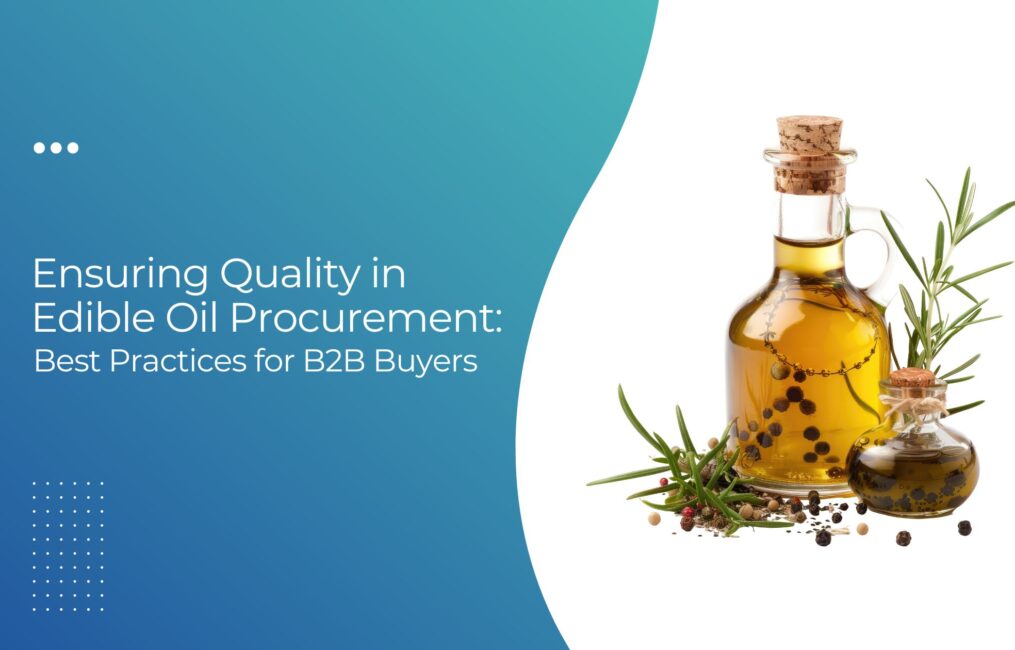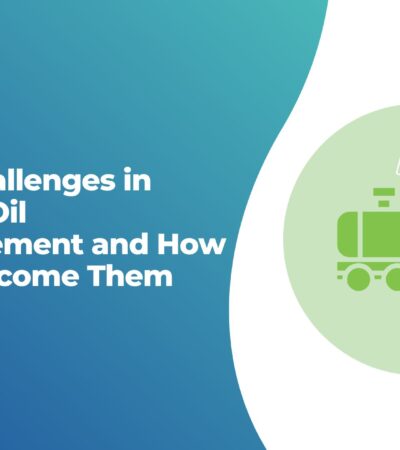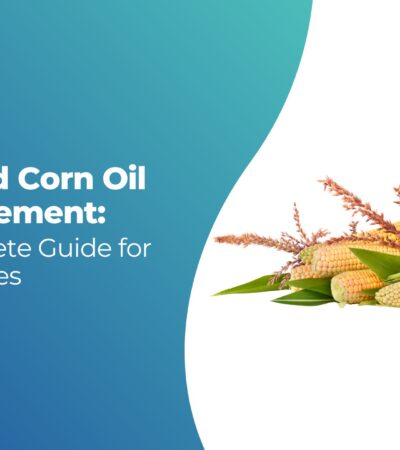Ensuring Quality in Edible Oil Procurement: Best Practices for B2B Buyers

In the global edible oil market, quality isn’t just a selling point—it’s a guarantee of performance, safety, and consistency across every stage of production. For B2B buyers—from food manufacturers and industrial processors to traders and institutional consumers—ensuring quality in edible oil procurement is critical. The oil you source directly affects your end product’s stability, taste, shelf life, and even regulatory compliance.
But achieving consistent quality in procurement is not as simple as comparing prices or choosing a supplier with the lowest quote. It requires a strategic approach that blends technical evaluation, supplier due diligence, and transparent sourcing systems.
In this blog, we explore the best practices that help B2B buyers ensure quality and reliability when procuring edible oils in bulk—and how trusted edible oil suppliers can make all the difference.
1. Understanding the Meaning of “Quality” in Edible Oil Procurement
The term “quality” in edible oil procurement goes beyond appearance and flavor. It involves measurable parameters that define oil safety, purity, and performance for various applications.
Some key quality indicators B2B buyers should always consider include:
- Refining standards – Ensure that oils meet industry-recognized refining benchmarks such as FFA (Free Fatty Acid) levels below 0.1%, minimal peroxide values, and neutral taste and odor.
- Purity and composition – Check that the oil is free from contaminants, adulteration, or residues from seeds or solvents.
- Stability – Evaluate oxidative stability, shelf life, and resistance to rancidity—especially for oils used in frying or long-term storage.
- Consistency – Procurement quality also means getting uniform results in every batch, ensuring your production line isn’t disrupted by variable oil performance.
- Traceability – A transparent supply chain adds trust and accountability, ensuring that the oil’s origin and processing details are verifiable.
In short, quality assurance starts before procurement—with an understanding of what the oil needs to achieve for your specific business or product.
2. Challenges in Maintaining Quality Across the Edible Oil Supply Chain
The edible oil industry operates on a complex network involving farmers, processors, refiners, distributors, and exporters. As a result, maintaining consistent quality throughout this chain can be challenging.
Common issues include:
- Supply chain fragmentation: Oils sourced from multiple refineries or intermediaries may show variation in parameters like color or FFA levels.
- Adulteration risks: Unscrupulous blending or contamination during storage can reduce purity.
- Storage and handling problems: Exposure to light, air, or high temperature during transit can degrade oil quality.
- Lack of supplier transparency: Without proper documentation or traceability systems, verifying the oil’s quality becomes difficult.
- Price fluctuations: Volatility in global edible oil prices can pressure buyers to compromise on quality in search of lower rates.
Overcoming these challenges demands procurement strategies that focus on quality control and supplier reliability, not just cost optimization.
Also Read: Edible Oil Procurement Challenges
3. Building a Quality-Focused Procurement Framework
For B2B buyers, having a structured framework ensures consistency and accountability in every purchase. A strong procurement process integrates technical specifications, supplier assessments, and continuous monitoring.
Here’s a step-by-step framework:
a. Define Quality Specifications
Before approaching suppliers, define the exact technical and quality specifications required for your end use.
Include parameters like:
- Moisture content and FFA levels
- Iodine value and peroxide value
- Color and clarity
- Odor and taste
- Packaging and shelf life requirements
These parameters should align with industry standards (like FSSAI, ISO, or Codex Alimentarius) and be clearly mentioned in your procurement contracts.
b. Source from Certified Edible Oil Suppliers
Certified suppliers and exporters follow internationally recognized refining and testing processes. Look for:
- ISO 22000 / HACCP certification for food safety
- FSSAI or GMP compliance
- Third-party lab testing reports
- Traceability systems and batch documentation
Partnering with reliable edible oil suppliers reduces the risk of receiving substandard or adulterated products.
c. Conduct Supplier Audits
If possible, conduct virtual or on-site supplier audits to review refining processes, quality control measures, and storage conditions.
An audit helps verify whether the supplier’s claims match their operational reality.
d. Request Pre-Dispatch Quality Reports
Before finalizing bulk shipments, request test certificates or COAs (Certificates of Analysis) to confirm the oil batch meets your quality benchmarks.
e. Include Quality Clauses in Procurement Contracts
A contract should clearly mention:
- Acceptance/rejection parameters
- Sampling methods
- Documentation requirements
- Penalties for deviation in quality
This provides legal and commercial protection for both parties and ensures accountability in quality delivery.
4. The Role of Supplier Relationships in Quality Assurance
A reliable supplier relationship goes far beyond transactional buying. Long-term partnerships encourage transparency, consistency, and proactive problem-solving.
When B2B buyers collaborate closely with their suppliers, they benefit from:
- Customized refining or blending options
- Priority allocation during supply disruptions
- Access to technical expertise
- Shared responsibility in maintaining standards
Leading bulk edible oil suppliers such as exporters or industrial refiners often act as strategic partners—helping buyers align procurement with production goals, sustainability targets, and compliance needs.
Building such trust requires clear communication, regular feedback, and long-term commitment—not just a focus on short-term price gains.
5. Quality Testing and Laboratory Analysis
For industries like food manufacturing, bakery, and ready-to-eat production, lab testing is indispensable. Buyers should either maintain in-house testing capabilities or work with third-party labs to validate each batch.
Common quality tests for edible oils include:
| Test | Parameter | Purpose |
| Free Fatty Acid (FFA) | % of fatty acids | Indicates oil degradation |
| Peroxide Value (PV) | meq O2/kg | Measures rancidity and oxidation |
| Iodine Value | g I2/100g oil | Determines saturation level |
| Saponification Value | mg KOH/g | Checks fatty acid composition |
| Moisture & Volatile Matter | % | Ensures storage stability |
| Color (Lovibond or Gardner scale) | – | Evaluates clarity and purity |
Using these analytical methods ensures that every consignment meets pre-approved standards and protects your brand from quality failures.
Also Read: Quality Assurance in Edible Oils
6. Importance of Packaging and Storage Conditions
Even the highest-quality oil can deteriorate if storage and packaging are not handled properly.
Packaging plays a vital role in maintaining oil freshness, preventing oxidation, and avoiding contamination.
Best practices include:
- Use of food-grade containers such as HDPE drums or flexitanks for bulk shipments.
- Proper sealing to avoid exposure to air and moisture.
- Storage in cool, dark environments to prevent oxidation and rancidity.
- Rotation of stock (FIFO system) to ensure older batches are used first.
- Avoiding contact with reactive metals or contaminants during handling.
Suppliers who maintain hygienic warehousing and provide logistical support for temperature-controlled shipments help preserve quality until the oil reaches your production line.
7. Evaluating and Shortlisting the Right Edible Oil Suppliers
For B2B buyers, selecting the right supplier is perhaps the most crucial step in maintaining quality consistency. A supplier isn’t just a source—they’re your partner in upholding product performance and regulatory compliance.
Here are some proven evaluation factors when shortlisting edible oil suppliers:
a. Proven Industry Experience
Look for suppliers with a track record of serving industrial-scale clients—especially in food manufacturing, confectionery, or bakery segments. Experience in international trade or exports also reflects the supplier’s quality awareness and logistical efficiency.
b. Refining & Processing Infrastructure
A strong refining setup ensures that oils are filtered, deodorized, and bleached under controlled conditions.
Suppliers with modern refining equipment, neutralization systems, and vacuum bleaching facilities are more likely to deliver refined oils with low impurities and high oxidative stability.
c. Testing Capabilities
A dependable supplier should maintain in-house laboratories capable of testing for FFA, peroxide value, moisture, and adulteration. This ensures quality verification at every stage—raw, intermediate, and final.
d. Sourcing Transparency
Traceability is key to ethical and sustainable procurement. Suppliers should be able to trace oil origins—from seed to shipment.
Buyers should request documentation covering:
- Origin of raw material (e.g., sunflower, soybean, or maize)
- Refinery location
- Batch number and date of production
- Quality certifications
Transparent sourcing not only builds trust but also strengthens your brand’s reputation in front of regulatory authorities and end consumers.
8. Embracing Technology in Edible Oil Procurement
Technology is transforming procurement across industries—and edible oils are no exception. Leveraging digital systems can dramatically improve quality control, traceability, and efficiency.
a. Blockchain Traceability
Blockchain-based procurement systems allow every transaction—from farmer to refiner to exporter—to be recorded and verified. This provides end-to-end transparency, minimizing the risk of adulteration and false labeling.
b. Digital Quality Dashboards
Some leading edible oil exporters and refiners now use integrated dashboards to share lab results, batch data, and logistics updates in real time.
For B2B buyers, this means faster decision-making and higher confidence in product integrity.
c. AI-Powered Quality Testing
AI-driven image and chemical analysis tools can now detect minor deviations in color, texture, or fatty acid composition. This ensures every batch meets set standards before dispatch.
By integrating such tools into the supply chain, B2B buyers can achieve continuous monitoring of edible oil quality and drastically reduce human error.
9. Global Sourcing and Quality Variability
With global trade expanding, edible oil procurement often involves cross-border sourcing—from regions like South America, Eastern Europe, and Southeast Asia. However, with opportunity comes variability.
Different regions produce oils with distinct fatty acid profiles, color, and shelf-life properties. For example:
- Sunflower oil from Ukraine tends to have a light color and mild flavor, ideal for snacks and frying.
- Soybean oil from Argentina offers balanced stability and is widely used in processed foods.
- Palm and maize oils from Asia are preferred for their oxidative resistance and cost efficiency.
When sourcing globally, lab testing and supplier documentation become even more important. Importing edible oils also requires compliance with country-specific food safety standards (such as FSSAI in India, EFSA in Europe, or FDA in the U.S.).
To ensure consistent quality, buyers should:
- Maintain multiple vetted suppliers per region.
- Use a standardized testing benchmark across all sources.
- Include country-of-origin verification in procurement documentation.
Global sourcing works best when supplier reliability and product testing go hand-in-hand.
10. Sustainability and Ethical Procurement
Modern B2B buyers are increasingly focusing on sustainability—not only for environmental reasons but also for long-term supply stability. Responsible sourcing practices reduce risk and align your brand with global sustainability goals.
Best practices include:
- Partnering with RSPO or ISCC-certified suppliers for sustainable palm or sunflower oil.
- Encouraging suppliers to minimize waste, emissions, and energy use in refining processes.
- Supporting traceable farming networks to promote fair practices and reduce deforestation-linked sourcing.
- Opting for suppliers who use renewable packaging or eco-friendly logistics.
Sustainability is no longer optional—it’s a procurement standard that strengthens quality, compliance, and brand value.
11. Regulatory Compliance and Food Safety
For edible oils used in food manufacturing, compliance with food safety regulations is non-negotiable. Procurement teams should ensure that all oils conform to:
- FSSAI or BIS standards (for Indian buyers)
- Codex Alimentarius guidelines (for global trade)
- ISO 22000 / HACCP certification
- Proper labeling with batch, expiry, and nutritional data
Additionally, importers and distributors must ensure documentation like Certificate of Analysis (COA), Material Safety Data Sheet (MSDS), and phytosanitary certificates accompany each batch.
Quality in edible oil procurement is not complete without end-to-end regulatory assurance.
12. Managing Price vs. Quality Trade-offs
Procurement often involves balancing cost efficiency with quality reliability.
While lower prices can be tempting, they often indicate compromise in refining standards, adulteration control, or logistics.
To maintain long-term stability, buyers should adopt a “Total Cost of Ownership” mindset—considering all costs associated with oil usage, including:
- Rejection or reprocessing costs due to poor quality
- Loss of production time
- Customer complaints or brand reputation damage
- Compliance risks
Working with trusted bulk edible oil suppliers ensures predictable pricing, flexible contracts, and unwavering quality—all critical for sustaining production efficiency.
13. Continuous Quality Monitoring and Supplier Feedback
Procurement quality doesn’t end at delivery. Continuous feedback loops between buyer and supplier help maintain and even improve quality standards over time.
Recommended steps include:
- Regular supplier performance reviews (based on delivery consistency, quality reports, and response times)
- Joint quality audits or improvement sessions
- Reporting systems for deviations or complaints
- Periodic recalibration of testing methods
This creates a collaborative ecosystem where both buyer and supplier work toward higher efficiency and mutual trust.
14. The Strategic Value of Quality-Focused Procurement
In today’s competitive edible oil market, businesses that prioritize quality in procurement gain a strategic edge. They achieve:
- Consistent product performance
- Reduced wastage and returns
- Enhanced brand credibility
- Stronger supplier relationships
- Compliance with evolving global standards
For B2B buyers in industries like snacks, bakery, dairy, or ready-to-eat meals, the procurement department directly influences product quality.
By making quality a measurable KPI, businesses ensure every drop of oil they use contributes to excellence, not risk.
15. Partnering with the Right Supplier: The Neshiel Advantage
For companies seeking bulk refined edible oils with assured purity and consistency, partnering with a trusted procurement specialist like Neshiel Agrochem Pvt. Ltd. makes all the difference.
With years of expertise in sourcing, refining, and global supply of edible oils—including Refined Sunflower Oil, Corn Oil, Soybean Oil, and Maize DDGS Oil—Neshiel ensures:
- Strict adherence to international quality standards
- Batch-wise testing and documentation
- Reliable supply chain management for bulk orders
- Custom solutions for industrial and food-grade applications
By combining technical precision, supplier transparency, and client-focused service, Neshiel supports B2B buyers in achieving procurement excellence—with guaranteed purity and performance in every consignment.
Final Thoughts
In the edible oil industry, quality assurance isn’t an afterthought—it’s the foundation of every successful procurement strategy.
For B2B buyers, the journey from evaluating suppliers to managing long-term contracts must revolve around consistent quality, transparency, and trust.
As global markets evolve, those who integrate technology, sustainability, and supplier collaboration into their procurement systems will stand out—not just for cost efficiency, but for delivering safe, stable, and superior-quality edible oils every single time.
FAQs
Q1. What factors define quality in edible oil procurement?
Quality in edible oil procurement depends on multiple parameters such as Free Fatty Acid (FFA) levels, peroxide value, color, odor, and moisture content. For B2B buyers, consistent refining standards, purity, stability, and traceability from source to delivery are the key quality benchmarks to ensure safe and high-performing edible oils.
Q2. How can B2B buyers ensure the reliability of edible oil suppliers?
Buyers should choose suppliers with proven industry experience, valid food safety certifications (ISO 22000, FSSAI, HACCP), and transparent sourcing practices. Conducting supplier audits, requesting Certificates of Analysis (COA), and maintaining continuous communication further help ensure reliability and accountability.
Q3. Why is traceability important in edible oil sourcing?
Traceability ensures every batch of oil can be tracked back to its origin—covering seed source, refining location, and processing date. It reduces risks of adulteration, supports food safety compliance, and builds trust with consumers and regulatory bodies.
Q4. What are the common challenges in maintaining edible oil quality during procurement?
Key challenges include inconsistent refining standards, adulteration risks, poor storage conditions, and lack of supplier transparency. To overcome these, B2B buyers must enforce strict quality controls, proper documentation, and regular testing at all stages of the supply chain.
Q5. What best practices can improve edible oil procurement for industrial buyers?
Industrial buyers should define clear quality specifications, work with certified suppliers, conduct periodic lab testing, include quality clauses in contracts, and use technology for traceability and monitoring. These practices ensure long-term consistency, compliance, and performance in bulk edible oil sourcing.





